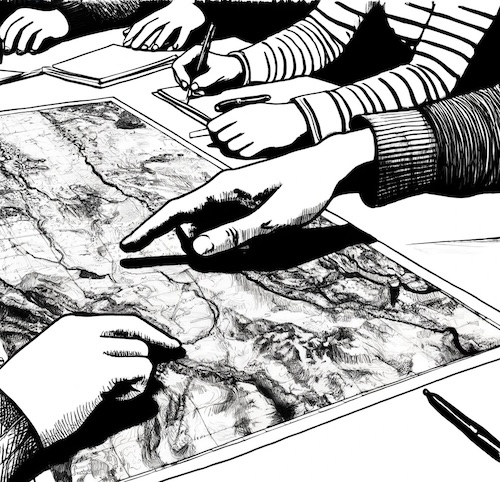In this live online geography course we’ll pair you with a seasoned educator for a deep dive into physical and human geography. Note that this is a standard middle- and high-school level course. For students interested in advanced study, take a look at our AP Human Geography Online Course.
Over the course of a semester or year (the duration and scope is up to you) this course iis designed to develop an understanding of geographical concepts and the ability to apply them to real-world scenarios.
Physical Geography
We’ll begin with an introduction to the earth, cartography, map making, and how physical processes shape our planet. We’ll look at both some aspects of earth science—such as earth structure, weathering processes, and planet dynamics like rivers, ocean currents, plate tectonics, and other elements of landscape formation.
Depending on your interests, we may linger a while on the history of map making and the way that our picture of our planet has evolved over time, and continues to change and improve in the era of satellite technology and advanced geographic information systems (GIS).
Human Geography
We will probably shift pretty quickly into what is known as human geography, or the study of people, populations, and land use. Together with your teacher, you’ll cover the core of human geography, including:
- Population and Settlement: Explores population dynamics, migration trends, and urbanization.
- Economic Geography: Discusses different economic sectors, development issues, and global economic trends.
- Environmental Management: Looks at sustainable development, resource management, and human impacts on the environment.
This course is often project-based. So, under the guidance of your private teacher, you may develop a large, semester-long project (or perhaps a series of smaller projects) to encapsulate your understanding of geography. Past projects have included videos, maps, papers, and elaborate physical models.
During this course, you can expect to develop some key social science skills, including:
- Data Handling: Students learn to analyze and interpret geographical data from various sources including maps, graphs, and statistics.
- Critical Thinking: The course encourages critical thinking about how geographical issues affect current and future global scenarios.
- Fieldwork: Practical fieldwork is a key component, helping students apply their learning to real environments, which may include local surveys or international trips.
Assessment
The course typically culminates in an external examination that assesses both factual knowledge and skills in application, including data response questions and essay writing. Continuous assessment during the course may include quizzes, assignments, and project work.
Objectives
The main objective of the course is to foster an understanding of the interrelationships between people and their environments, promote awareness of global issues, and develop geographical skills that are applicable in a wide range of careers. Students are encouraged to think globally and act locally, preparing them to contribute positively to a rapidly changing world.
Geography is a wide-ranging social science that studies place—the globe, countries, regions, localities—through either a physical or socio-economic lens. It provides a fantastic preparation for any social science on the college level, such as economics, sociology, or politics.
While geography is technically a social science course, it requires strong quantitative and technological skills such as data analysis, GIS, and climate modeling.

